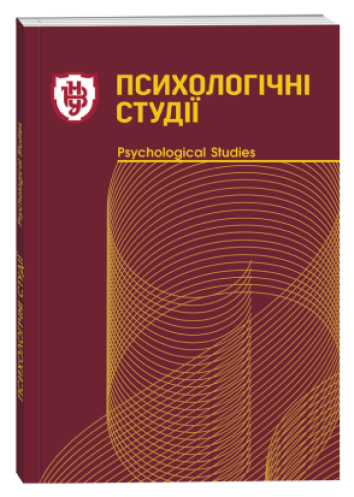PUNISHMENT AS A FACTOR OF INFLUENCE ON ADOLESCENT SELF-REGULATION
DOI:
https://doi.org/10.32782/psych.studies/2023.1.1Keywords:
adolescents, self-regulation, crime, punishment, social frustration, rigidity, planning, programming, adolescent crisis.Abstract
This article examines the impact of different sentences in prison on adolescents’ self-regulation, social frustration, and stimulus sensitivity. The study involved 60 adolescents in the Kremenchuk educational colony. Juvenile delinquency is a parasitic antisocial phenomenon that has a destructive impact on law and order and is rapidly corrupting the rule of law. The study was conducted using the Carver-White questionnaire, methods of diagnosing the «Style of behavior regulation» by V. Morosanov and diagnosing the level of social frustration by L. Wasserman in the modification of V. Boyko. The study found that among adolescents serving a sentence of up to six months, there is a low level of self-control, planning, and a certain amount of rigidity, the main incentives are their own pleasure, the desire for hedonism and the promised reward. Whereas adolescents serving two years or more of a sentence are characterized by a high level of self-control and self-regulation, and their main motivators are their own patience and reaction to negative stimuli. That is why the peak of rapid crime development is most clearly observed in the most unstable periods of the state’s existence. At the same time, recidivism, which actively develops in times of crisis, increases the negative impact of the relevant crisis processes, and calls into question both the authority of the state and the means of education in the family and educational institutions. The study of the personality of adolescents serving sentences in prisons is an urgent task, the implementation of which will contribute to the improvement of special crime prevention policy in Ukraine, as well as to the creation of self-regulation skills training for adolescents. The practical significance of the results obtained is that the provisions set forth in this paper can be used in the research field – for further theoretical study of a person sentenced to imprisonment. In law enforcement – to optimize the implementation of measures to prevent criminal manifestations; in the educational process – to develop methods, trainings, textbooks and manuals.
References
Балабанова Л. М. Особливості агресивної поведінки неповнолітніх / Л. М. Балабанова, І. О. Віденєєв, П. В. Макаренко та ін. Матеріали круглого столу «Девіантна поведінка: соціологічний, психологічний юридичний аспекти». Харків: ХНУВС. 2008. С. 35–38.
Бесчастний, В.М. Теорія та практика кримінологічного забезпечення протидії злочинності в Україні : автореф. дис. … д-ра юрид. наук : 12.00.08. Бесчастний Віктор Миколайович; МВС України, Харк. нац. ун-т внутр. справ. Харків, 2018. 34 с.
Землянська О. В. Психологічні особливості злочинної поведінки неповнолітніх. О. В. Землянська. Зб. наук. праць Інституту психології ім. Г. С. Костюка АПН України; ред. С.Д. Максименко. Київ, 2001. Т.ІІІ, Ч. 1. С. 163–168.
В. Ф. Маценко, Ж. М. Маценко Психосинергетичні особливості сталих та кризових періодів життя людини: монографія. Київ : Педагогічна думка, 2015. 197 с.
Рущенко І. П. Соціологія злочинності: монографія. Харків: Націон. ун- ту внутр. справ, 2001. 370 с.
Скриннікова Н. С. Кримінологічна характеристика особи неповнолітнього злочинця (жіночої статі), яка вчиняє злочини в Україні. Вісник Запорізького національного університету. Сер.: Юрид. науки. Запоріжжя. 2010. Вип. 3. С. 153–158
В. П. Андрушенко, В. П. Бех. Соціальна робота. Короткий енциклопедичний словник. авт. кол. Київ: ДЦССМ, 2002. 536 с.
Тимченко А. П., Момотюк В. О. Попередження злочинності в Україні. Молодіжний науковий юридичний форум : м. Київ, Національний авіаційний університет, 18 травня 2017 р. Том 1. Тернопіль: Вектор. 356 с.







